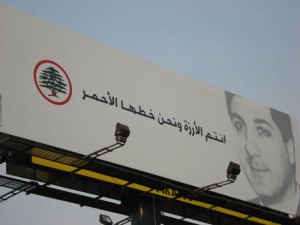If there will be one thing to remember out of all this mess that came to be labeled as the Lebanese situation it is the continuously imaginative babbling of this french-language media outlet. The only problem with imagination is that it can be very destructive. I would love to always have hard laughs when I read l’Orient le jour titles, such as this last one: “baptême du feu de Sleiman dans le concert des nations”, referring to the recent visit of Lebanese president Sleiman to the UN as a “baptism of fire”, that L’OJ still calls in a stupidly and naive war “the concert of nations”. But laughs turn quickly to ulcers when I read stuff like this:
Dimanche dernier, on a vu Samir Geagea formuler de profondes, franches et totales excuses publiques pour tout le mal injustifié dont a pu se rendre coupable, durant la guerre, la milice des Forces libanaises. Ce n’était certes pas la première fois qu’un chef libanais se livrait à une courageuse autocritique. Nul cependant n’était allé aussi loin dans l’énoncé du regret : lequel, par son impressionnante clarté, traduisait aussi un renoncement on ne peut plus solennel aux cruelles pratiques des bêtes de guerre.
Now let’s ponder a minute. This was an extract taken from Issa Gorayeb’s editorial, effectively defending Samir Geagea’s mea culpa this last Sunday during the LF martyr’s mass that I talked about in a previous post. Ok I won’t elaborate much, but just think about an analogy. If Saddam Husein say was alive today (not that I think Geagea has the same stature as Saddam but let’s assume) and Saddam would have stood to say that he’s sorry for the people he gazed in Kurdish villages. And then, a columnist would have praised these “sincere, and profound apologies” depicting the act as profoundly ‘courageous’. What would you have thought of this? Well, that’s precisely what just happened. I follow the writings of Ghorayeb since I’m 15. It is a slow march towards endlessly rotting decay. It seems that there is no end to it really.
But the one who saves this piece of toilet paper that is OJ as would ingeniously call it another blogger, is Fadi Noun, who writes still in the same issue the following:
Aussi spectaculaire que soit la confession du chef des Forces libanaises, elle reste insuffisante. Son caractère public et général la prive de la profondeur voulue ; le ton utilisé pour la prononcer, ainsi que le volet proprement politique du discours qui l’a suivie, en annulent en partie l’effet ; enfin le fait qu’il ait été prononcé à l’occasion d’une messe entretient la confusion sur sa nature.
Il faut savoir gré à Samir Geagea d’avoir utilisé le mot « ignoble » pour décrire certains actes qu’il regrette, que ce soit en son nom propre ou au nom des Forces libanaises, encore qu’il y ait là deux choses distinctes. C’est courageux, purificateur. C’est le mot juste pour parler de ces jeunes abattus sans merci « pour l’exemple », ou de cet homme tiré de son lit d’hôpital malgré les supplications d’une religieuse à genoux, et jeté en mer, les pieds pris dans un bloc de béton.
C’est aussi le mot qui vient aux lèvres de cet ancien milicien qui, sur les lieux d’un couvent désaffecté pour lequel on cherche une nouvelle fonction, et qui fut utilisé comme caserne durant la guerre, affirme « entendre encore les cris des Palestiniens qu’on y a enterrés vivants ».
I personally know more morbid stories on Samir Geagea and to that matter Bashir Gemayel. Very dirty stuff believe me. Basically we need another raid on Beirut by Hizbullah that this time gets other wackos (SSNP style) to burn the offices of this endlessly rotting institution. I can lead the battalion!






